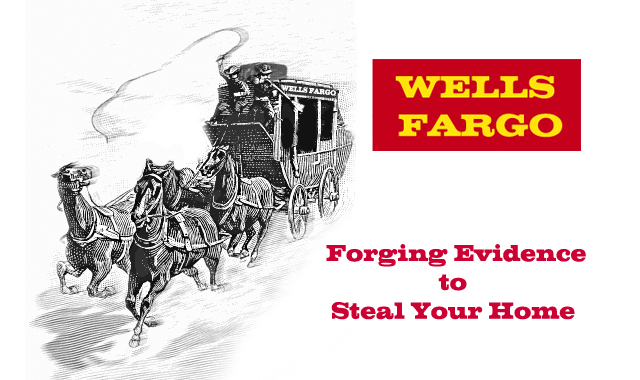
The affiants routinely signed and certified that they had personal knowledge of the contents of documents, including affidavits, without the benefit of supporting documentation and without reviewing the source documents referred to in the affidavits and verifying the accuracy of the foreclosure information stated in the affidavits. A number of affidavit signers admitted having signed up to 600 documents per day. A number of employees engaged as robosigners had little or no education beyond high school and little or no experience in banking or real estate. Work histories (when available) showed a lack of qualifications to hold the titles held by affiants; for example, vice president of loan documentation. Moreover, interviews disclosed that the titles were given for the sole purpose of allowing the individual to sign documents and came with no other duties or authority.
Employees who notarized documents, including affidavits, routinely did not witness the signature of the documents and notarized up to 1,000 documents per day. Reviews of personnel files and the interviews also raised concerns that Wells Fargo may have hired and designated unqualified persons as “vice president of loan documentation,” with the sole responsibility as vice president being to sign affidavits.
For example, immediately before Wells Fargo hired an individual to be vice president of loan documentation, the person worked at a pizza restaurant and as a bank teller. Another had been a department store cashier and daycare worker, while another had worked on the production line in a factory. These same persons also often worked in other positions at Wells Fargo, generally without a direct relationship to foreclosure affidavits. These persons told us that Wells Fargo gave them the title vice president of loan documentation for the sole purpose of having them sign affidavits. Most affidavit signers told us that they did not have the related education or work history to prepare them to sign the affidavits. They also told us that Wells Fargo did not provide them training when they began signing affidavits. It wasn’t until October 2010 that training began and then only as result of our review.
~
Wells Fargo Bank Foreclosure and Claims Process Review
March 12, 2012
MEMORANDUM
FOR: Charles S. Coulter, Deputy Assistant Secretary for Single Family Housing, HU
//signed//
FROM: James D. McKay, Regional Inspector General for Audit, Atlanta Region, 4AGA
SUBJECT: Wells Fargo Bank Foreclosure and Claims Process Review Fort Mill, SC
INTRODUCTION AND BACKGROUND
As part of the Office of the Inspector General’s (OIG) nationwide effort to review the foreclosure practices of the five largest Federal Housing Administration (FHA) mortgage servicers, (Bank of America, Wells Fargo Bank, CitiMortgage, JP Morgan Chase, and Ally Financial, Inc.) we reviewed Wells Fargo’s foreclosure and claims processes. In addition to this memorandum, OIG issued separate memorandums for each of the other four reviews.1 OIG also plans to issue a summary memorandum reporting the results of all five memorandums. We performed these reviews due to reported allegations made in the fall of 2010 that national mortgage servicers were engaged in widespread questionable foreclosure practices involving the use of foreclosure “mills” and a practice known as “robosigning”2 of sworn documents in thousands of foreclosures throughout the United States. We initially focused our efforts on examining the foreclosure practices of servicers in judicial States and jurisdictions in which they do business. 3
Wells Fargo is a supervised FHA direct endorsement lender that can originate, sponsor, and service FHA-insured loans. During the period October 1, 2008, through September 30, 2010,4 Wells Fargo submitted 14,420 claims on foreclosed loans to FHA for payment in the 23 judicial States and jurisdictions totaling about $1.7 billion.5
Because we identified potential False Claims Act6 violations, we provided the U.S. Department of Justice (DOJ) with our analyses and preliminary conclusions as to whether Wells Fargo engaged in the reported foreclosure practices. DOJ used our review and analysis in negotiating a settlement agreement with Wells Fargo. On February 9, 2012, DOJ and 49 State attorneys general announced a proposed settlement of $25 billion with Wells Fargo and four other mortgage servicers for their reported violations of foreclosure requirements. As part of the proposed settlement agreement, each of the five servicers will pay a portion of the settlement to the United States and also must undertake certain consumer relief activities. The proposed settlement agreement described tentative credits that each mortgage servicer would receive for modifying loans, including principal reduction and refinancing, and established a monitoring committee7 and a monitor to ensure compliance with agreed-upon servicing standards and the consumer relief provisions. Once the final settlement agreement has been approved by the courts, OIG will issue a separate summary memorandum detailing each of the five servicers’ allocated share of payment due as a result of the settlement agreement.
Our objective was to determine whether Wells Fargo complied with applicable foreclosure procedures when processing foreclosures on FHA-insured loans.
Full report below…
~
4closureFraud.org
~
Wells Fargo Bank Foreclosure and Claims Process Review

No Comment